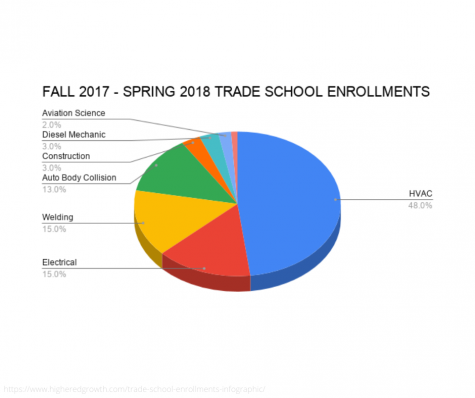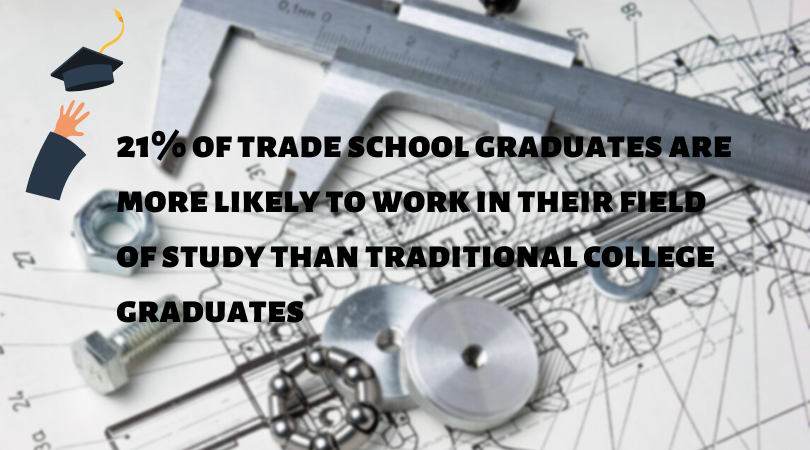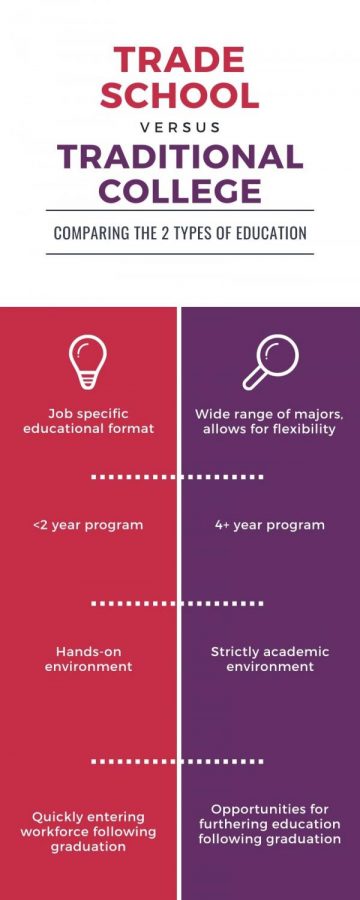Choosing to attend a trade school provides broader opportunities
December 10, 2019
Students who aspire to be engineers, plumbers, electricians, welders and more seem more and more rare these days, leading one to question the importance and consequently the respectability of the manual workforce. However, it should not come as a surprise that neither the importance nor integrity of said jobs have diminished, in fact, the significance and necessity only skyrocketed in recent years.
Trade schools, also called technical or vocational schools, offer post-secondary education for students searching to learn technical skills that will prepare them for a specific career. This exists as the key difference between trade schools and traditional colleges. Traditional colleges and universities offer more general education programs, with options to specify with a minor or major. Programs can last anywhere between eight months and two years and when one graduates from a trade school they usually receive a diploma or certificate, and less frequently an associate degree.
Trade schools train skills specific to a certain vocation. Some examples of these schools include Georgia Piedmont Technical College, Ivy Tech Community College, and Western Wyoming Community College. One can earn degrees in nursing and health sciences, information technology, engineering and more. Prospective students tend to see trade schools as a viable and attractive option due to the fact that the programs heavily utilize hands-on training and can offer or make way for paid apprenticeships. Shop skills like mechanical, electrical, automotive, carpentry and plumbing exist as popular courses, however, courses are not limited to trade skills. Trade schools offer a wide variety of classes from music production to fashion design.

The demand for trade workers is projected to continue to creep upward since it took a massive blow during the years of the U.S. housing crisis. Employment that required trade skills dropped 13 percent from 2007 to 2009 but rebounded 6.2 percent after the recovery, and that demand, especially in manufacturing, infrastructure, and transportation fields, is expected to increase dramatically over the next couple of decades as baby boomers retire. Boomers make up 32.4 percent of the skilled trades workforce which prompts the common concern in America that upcoming generations may lack the amount of qualified and interested workers to fill the gap they will leave.
All this begs the question, with the projection of such a need for trade skills in America, why do high school students do not receive information or encouragement for pursuing that route?
To add to the number of attractive factors in choosing a vocational route, one may notice pricing. Traditional college tuition rose massively in the past couple of decades, creating a greater need to qualify and apply for scholarships and take out loans. An abundance of students experience immense stress in their efforts to afford a university they wish to attend. Price becomes an ultimatum in students’ post-secondary pathways, leading them to choose colleges they may not truly desire just because that college seems like their only viable option.
“I’m the third child my parents are sending to college and they can’t afford an out of state school unless I can procure significant scholarship money because out of state is typically at least 30,000 dollars. It’s always been my dream to go out of state, but if I can’t make a full ride or close to it, I’ll have to go instate and rely on Zell Miller instead,” Magnet senior Maggie Glancy said.
Vocational schooling prices, especially for public schools, tend to land much lower in tuition prices and/or offer more in the way of scholarships and grants. This may be attributed to the scarcity of trade school attendees compared to that of college attendees, but mostly resulting in the reduction of the amount of time spent in a classroom. Required trade school courses only include those relevant to one’s chosen profession.
“It’s [trade school] way cheaper than college and way less rigorous because you just learn the trade you need. A lot of jobs that require trade skills are in very high demand at the moment so trade school is easy to get into and sometimes will even pay for you to go there,” Magnet senior Tanner Corbett said.
The stigma surrounding attending a four-year college, undeniably, is enforced on nearly every young persons’ brain. High schools push the ideal a college education on pupils from freshman to senior year, and students barely ever entertain other options. A good amount of blame should also be doled out to parents, especially those with a background in higher education. The expectation of higher education becomes cyclical in these scenarios. Traditional college is deemed the appropriate and intelligent path to take following high school, however, the misconceptions and misinformation about trades may end up leading the future workforce away from a stable job that could be provided by vocational training. Even still, an abundance of jobs necessitate specialized training that only trade skills programs provide, and these tend to be completed after one earns their degree.

“I wouldn’t say there is a disinterest as much as there is a lack of knowledge in available skilled trade careers. Not all students are suited for a career in the skilled trades just as not all students are suited to attend college. Students’ eyes are opened when they learn about the type of salary that can be earned in a skilled trade so I expose them to many opportunities and hopefully, they’ll choose a career path that best suits their interests. A former student who graduated in the spring of 2019 is currently attending Georgia Trade School and another current student will begin attending night classes at Georgia Trade School in February,” Construction Technology teacher Brent Branning said.
Not all students excel at academics and not all students prefer to study academics either. Society tends to look at students who hold little inclination to their high school studies as lazy and unsuccessful. However, this perception fails to account for the plethora of other impressive and more importantly, needed skills. If students received the same amount of encouragement to attend trade school as they did traditional college, these kinds of students would see options more attractive to them and more conducive to the future they may desire.
“Trade school is a very good option for a lot of kids who are being pushed to go to college. There are kids who want to go to college who should go to college but there are a lot of kids who would be better off going to trade school. The student body should have more knowledge and awareness of that option,” Corbett said.

The lack of attention brought to the vocational route cannot be blamed fully on teachers. At NC, academic teachers generally preach what applies to their classes best — meaning trade schools simply do not make the cut. Career technology teachers that teach classes such as engineering and construction expectedly mention them to their pupils, but these classes can seem like an added workload to unmotivated high school students and only a tiny fraction of NC takes these courses.
“The current construction pathway at North Cobb is plumbing, which is the third level class. However, I expose all students at each level to as many career opportunities that I can. I bring in numerous business partners throughout the semester to talk to each class about career opportunities with their companies and the career paths available. Each semester I take each class to Georgia Trade School in downtown Acworth to get hands-on experience in the welding trade. I think the courses offered at North Cobb are in line with the demand for vocational classes,” Branning said.
Although the trade school route does not necessarily receive huge amounts of disdain or criticism, it remains seen as a less attractive option, something not as fulfilling or important as traditional college. That stigma threatens America’s vital future workforce and can detrimentally affect the lives of students who struggle with and/or dislike traditional education.
Workers with trade skills will see bright futures in the coming decades, and for all the rest to come. Society will always need tradespeople like mechanics and electricians to make sure all the accommodations that we have grown used to run smoothly.


sarah • Apr 5, 2021 at 11:43 AM
Rightly said so. These manual jobs requires expertise and experience which trade schools offer better and these jobs now have a huge demand. But choosing such line of work should be done only if they wish to learn and willing to serve the community.
https://smarterplumbers.com provides articles on how to become a plumber in the different states of USA.